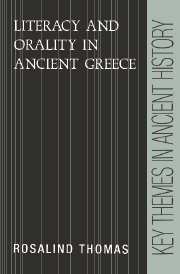Book contents
- Frontmatter
- Contents
- List of figures
- Acknowledgements
- List of abbreviations
- 1 Introduction
- 2 Literacy and orality
- 3 Oral poetry
- 4 The coming of the alphabet: literacy and oral communication in archaic Greece
- 5 Beyond the rationalist view of writing: between ‘literate’ and ‘oral’
- 6 Orality, performance, and memorial
- 7 Literacy and the state: the profusion of writing
- Epilogue: the Roman world
- Bibliographical essay
- Bibliography
- Index
6 - Orality, performance, and memorial
Published online by Cambridge University Press: 18 January 2010
- Frontmatter
- Contents
- List of figures
- Acknowledgements
- List of abbreviations
- 1 Introduction
- 2 Literacy and orality
- 3 Oral poetry
- 4 The coming of the alphabet: literacy and oral communication in archaic Greece
- 5 Beyond the rationalist view of writing: between ‘literate’ and ‘oral’
- 6 Orality, performance, and memorial
- 7 Literacy and the state: the profusion of writing
- Epilogue: the Roman world
- Bibliographical essay
- Bibliography
- Index
Summary
What does the prevalence of oral communication imply for later Greek culture? In what way does it really change our understanding of the ancient world? Is orality a useful tool of analysis? Is it largely specific to a given culture, like literacy (as I tentatively suggested for the field of Homeric epic)? Much recent work on Greek orality has been connected with the stylistic study of specific Greek authors. But it is time to get beyond stylistic analyses and move into areas more difficult to discuss but equally important to any understanding of oral communication, that is, the performance and context of Greek literature (and attention is increasingly turning to this). We need also to consider more sympathetically how oral communication may have affected not so much individual style or mentality, but our own evidence and judgements. Many of our problems in understanding Greek culture stem simply from the lack of accurately preserved material.
ARCHAIC AND CLASSICAL ORALITY: ORALITY AS A TOOL OF ANALYSIS
Most discussion of orality and oral communication in Greece after the period of the Homeric poems suffers from an inability to detach itself from the lines of debate used for Homer, and accordingly concentrates on formulaic style.
- Type
- Chapter
- Information
- Literacy and Orality in Ancient Greece , pp. 101 - 127Publisher: Cambridge University PressPrint publication year: 1992

